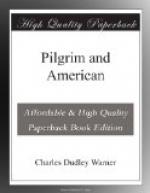But this in its kind is an old story. It is an experiment that has been repeated over and over. History is the record of the rise of splendid civilizations, many of which have flowered into the most glorious products of learning and of art, and have left monuments of the proudest material achievements. Except in the rapidity with which steam and electricity have enabled us to move to our object, and in the discoveries of science which enable us to relieve suffering and prolong human life, there is nothing new in our experiment. We are pursuing substantially the old ends of material success and display. And the ends are not different because we have more people in a nation, or bigger cities with taller buildings, or more miles of railway, or grow more corn and cotton, or make more plows and threshing-machines, or have a greater variety of products than any nation ever had before. I fancy that a pleased visitor from another planet the other day at Chicago, who was shown an assembly much larger than ever before met under one roof, might have been interested to know that it was also the wisest, the most cultivated, the most weighty in character of any assembly ever gathered under one roof. Our experiment on this continent was intended to be something more than the creation of a nation on the old pattern, that should become big and strong, and rich and luxurious, divided into classes of the very wealthy and the very poor, of the enlightened and the illiterate. It was intended to be a nation in which the welfare of the people is the supreme object, and whatever its show among nations it fails if it does not become this. This welfare is an individual matter, and it means many things. It includes in the first place physical comfort for every person willing and deserving to be physically comfortable, decent lodging, good food, sufficient clothing. It means, in the second place, that this shall be an agreeable country to live in, by reason of its impartial laws, social amenities, and a fair chance to enjoy the gifts of nature and Providence. And it means, again, the opportunity to develop talents, aptitudes for cultivation and enjoyment, in short, freedom to make the most possible out of our lives. This is what Jefferson meant by the “pursuit of happiness”; it was what the Constitution meant by the “general welfare,” and what it tried to secure in States, safe-guarded enough to secure independence in the play of local ambition and home rule, and in a federal republic strong enough to protect the whole from foreign interference. We are in no vain chase of an equality which would eliminate all individual initiative, and check all progress, by ignoring differences of capacity and strength, and rating muscles equal to brains. But we are in pursuit of equal laws, and a fairer chance of leading happy lives than humanity in general ever had yet. And this fairer chance would not, for instance, permit any man to become a millionaire by so manipulating railways that the subscribing towns




